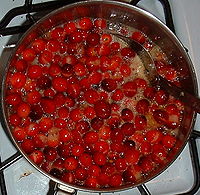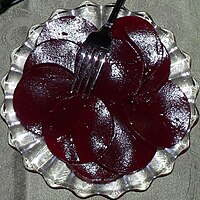Cranberry sauce
 | |
| Alternative names | Cranberry jam |
|---|---|
| Place of origin | United States |
| Main ingredients | Cranberries, sugar, water |
Cranberry sauce or cranberry jelly[1] is a sauce or relish made out of cranberries, commonly served as a condiment with Thanksgiving dinner in North America and Christmas dinner in the United Kingdom and Canada. There are differences in flavor depending on the geography of where the sauce is made: in Europe it is generally slightly sour-tasting, while in North America it is typically more heavily sweetened.
History
Cranberry sauce was first offered to consumers in North America in 1912 Hanson, Massachusetts.[2] Canned cranberry sauce appeared on the market in 1941, allowing the product to be sold year-round.[3]
Preparation
The most basic cranberry sauce consists of cranberries boiled in sugar water until the berries pop and the mixture thickens. Some recipes include other ingredients such as slivered almonds, orange juice, zest, ginger, maple syrup, port, or cinnamon.
Commercial cranberry sauce may be loose and uncondensed, or condensed or jellied and sweetened with various ingredients. The jellied form may be slipped out of a can onto a dish, and served sliced or intact for slicing at the table.
Cranberry sauce is often eaten in conjunction with turkey for Christmas in the United Kingdom and Canada or Thanksgiving in the United States and Canada, and it is only rarely eaten or served in other contexts there.[4]
-
Cranberries popping
-
A jar of cranberry sauce
-
Cranberry jelly from a can, sliced
See also
References
- ^ Pyenson, Andrea. "A tale of two side dishes". The Boston Globe. Retrieved 2010-11-25.
- ^ "History of Cranberries". Cape Cod Cranberry Growers' Association. Retrieved 28 November 2015.
- ^ Smith, K. Annabelle (27 November 2013). "This Man Made the First Canned Cranberry Sauce". Smithsonian magazine. Retrieved 28 November 2015.
- ^ Wallendorf, Melanie; Arnould, Eric (1991). ""We Gather Together": Consumption Rituals of Thanksgiving Day". Journal of Consumer Research. 18 (1). University of Chicago Press: 13–31. doi:10.1086/209237. JSTOR 2489481.



